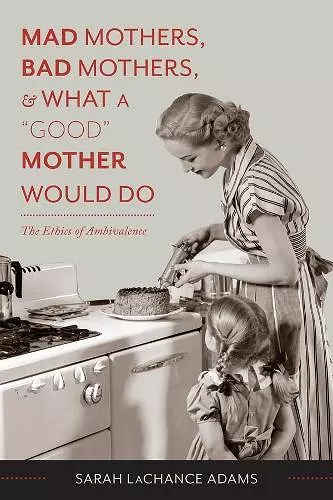Mad Mothers, Bad Mothers, and What a "Good" Mother Would Do
The Ethics of Ambivalence
Format:Paperback
Publisher:Columbia University Press
Published:16th May '14
Currently unavailable, our supplier has not provided us a restock date

When a mother kills her child, we call her a bad mother, but, as this book shows, even mothers who intend to do their children harm are not easily categorized as "mad" or "bad." Maternal love is a complex emotion rich with contradictory impulses and desires, and motherhood is a conflicted state in which women constantly renegotiate the needs mother and child, the self and the other. Applying care ethics philosophy and the work of Emmanuel Levinas, Maurice Merleau-Ponty, and Simone de Beauvoir to real-world experiences of motherhood, Sarah LaChance Adams throws the inherent tensions of motherhood into sharp relief, drawing a more nuanced portrait of the mother and child relationship than previously conceived. The maternal example is particularly instructive for ethical theory, highlighting the dynamics of human interdependence while also affirming separate interests. LaChance Adams particularly focuses on maternal ambivalence and its morally productive role in reinforcing the divergence between oneself and others, helping to recognize the particularities of situation, and negotiating the difference between one's own needs and the desires of others. She ultimately argues maternal filicide is a social problem requiring a collective solution that ethical philosophy and philosophies of care can inform.
This book is an important addition to the existing literature in feminist and phenomenological thought on mothering. -- T. L. Welsh, University of Tennessee at Chattanooga LaChance Adams's insightful crafting of an existentially informed ethic of care will be a serious and influential contribution to feminist thought in a variety of disciplines and on a variety of topics. -- Sheila Lintott, Bucknell University In Mad Mothers, Bad Mothers, Sarah LaChance Adams gives a compelling account of maternal ambivalence. Engaging care ethics and classical phenomenology, she not only challenges the place of mothers and the maternal in these philosophies but also develops an alternative ethics of maternal ambivalence. Taking the mother's conflicting needs and desires to nurture, on the one hand, and to be independent and free of care-taking responsibilities, on the other, as a model for the ethical relationship, she argues that all human relationships are ambivalent. Moreover, it is this ambivalence that makes them ethical. She shows how the conflict between care and independence is at the heart of all ethical relationships. Mad Mothers, Bad Mothers is beautifully written and compellingly argued. -- Kelly Oliver, Vanderbilt University LaChance Adams's beautifully argued, wonderfully accessible book goes back to mothers' lived experience in all its complexity. Boldly juxtaposing the full range of testimonials with brilliant phenomenological rereadings of Emmanual Levinas, Maurice Merleau-Ponty, and Simone de Beauvoir, she shows us the lessons we can draw from maternal ambivalence. LaChance Adams speaks with and to all mothers and philosophers. Indeed, she deftly takes down the instrumentalizing abstraction of maternity in the phenomenological tradition while simultaneously building its insights back into an ethics for the real world. Readable, thought-provoking, and imaginative, this short book will engage readers in philosophy, psychology, and gender studies. -- Cressida J. Heyes, University of Alberta This is the most important book on maternal ethics since Sara Ruddick's Maternal Thinking. LaChance Adams is an eloquent new voice in feminist philosophy who gives us precisely the kind of thinking we need in a world in which idealized images and stories of perfect parents purified of ambivalent feelings toward their children are juxtaposed next to images and stories of cruel parent-monsters. This is a brave, passionate, intelligent, and honest account of the ethical intensities, battles, ambiguities, and promises of the parent-child relation. -- Bonnie Mann, University of Oregon Sarah LaChance Adams draws on phenomenological and existentialist theory, feminist thought, the life sciences, qualitative research, poetry, and cultural observation in order to paint a textured picture of motherhood as an ethically complex status fraught with ambiguity. Refreshingly avoiding both romanticism and social hysteria, this book is an invaluable addition to the burgeoning philosophical literature on motherhood. -- Rebecca Kukla, Georgetown University
ISBN: 9780231166751
Dimensions: unknown
Weight: unknown
272 pages